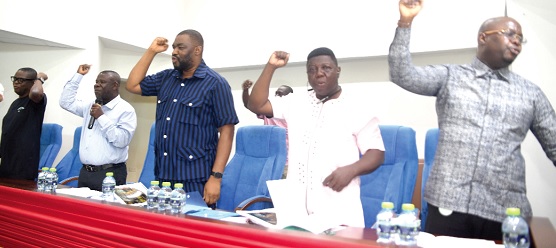
Consider vast mineral wealth driver of transformation - TUC
The General-Secretary of the Ghana Mineworkers Union of the Trade Union Congress (TUC), Abdul -Moomin Gbana, has advocated the need for the country to consider Africa’s vast mineral wealth as an important driver of its structural transformation.
Speaking at the meeting of the national executive council of the Mine Workers Union of the TUC, he said the current situation where the continent did not harness the full potential of its mineral endowments for sustainable and inclusive development was worrying.
Advertisement
“Mineral resources are extracted mainly for processing and use outside the continent, and the mineral sector has remained an enclave disconnected from the broader economy.
The sharp contrast between natural resource abundance and poverty in Africa is troubling, considering the fact that Africa has 30 per cent of the world's natural resources” he said.
Mineral-rich
Mr Abdul-Moomin Gbana said in several mineral-rich African countries such as Zambia, Mozambique, Angola and Nigeria, public debt and fiscal stress had been rising as governments sought to plug the huge gaps in national treasuries left by falling revenues.
He said as countries scrambled to renegotiate mineral contracts to raise tax income, there was a real fear of a renewed ‘race to the bottom’, with unfair contracts and tax incentives being granted to extractive companies’’, he said.
He further stated that while it was clear that Africa needed to create local value from mineral extraction, build industries and create jobs, it was equally important to recognise the influence of underlying structural factors in realising the transformative ambitions of the Africa Mining Vision.
‘’These include the weak capacity in state regulatory institutions, the lack of effective, coordinated industrialisation strategies in many African countries that link mining with manufacturing, agriculture and service sectors and the shrinking policy space available to African states in the global political economy’’, he added.
Mr Gbana said in the aftermath of the Structural Adjustment Programmes (SAP) in the 1980s and 1990s, the policy space available to African states to truly develop and craft industrial policies had shrunk, while domestic manufacturing capacity had declined in the long term, with high levels of aid dependence.
This, he stated, implied that the state’s capacity for the design and implementation of industrial policies was limited.
He said after over 100 years of mining, Ghana’s mining industry continued to be dominated and controlled by foreign interests, with over 99 per cent of mining companies being foreign, owning 90 per cent of the shares, with the government left with a paltry 10 per cent carrying interest.
‘’Without a doubt, the government has since the 80s shied away from the mining sector instead of confronting this sorry narrative of our over dependence and reliance on a foreign dominated sector’’, he said.
The General-Secretary also appealed to the government to reconsider the introduction of an additional income tax bracket of 35 per cent from 30 per cent, the increase in Value Added Tax (VAT) rate by two and a half percentage points from 12.5 per cent to 15 per cent in order not to exacerbate the hardships workers were going through .
Crises
He explained that the increases would further worsen the cost-of-living crises that workers and citizens of this country were currently going through amidst the high inflationary pressures.
The General Secretary of the Socialist Movement of Ghana (SMG), Kwesi Pratt Jnr, in a contribution said the masses could not rely on those who caused the economic, political, social and environmental crisis in the society to provide the solution.
‘’ It is about time that the masses of our people stand up and say enough is enough and time for us to build the kind of society that is not only possible but also necessary’’, he said.
Mr Pratt Jnr said the mine workers union, with a membership of 12,000, was a formidable army of working class whose history began in June 1944 in resistance to the many years of colonial domination, abuse and exploitation.



